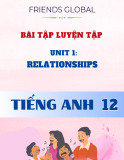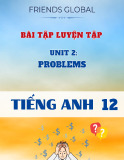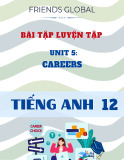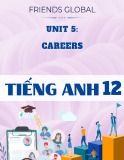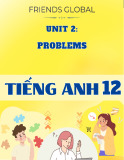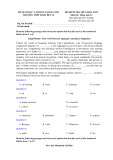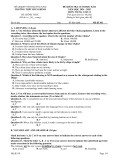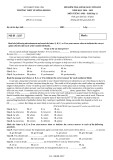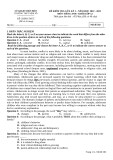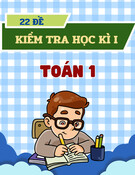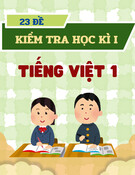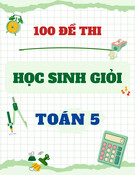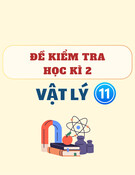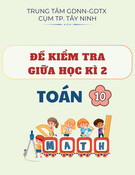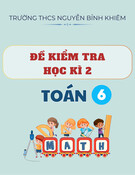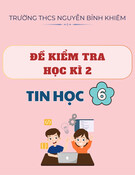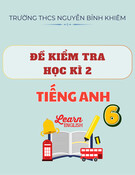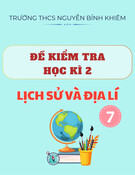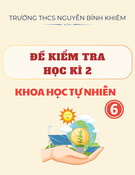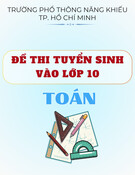Ừ Ề Ể Ọ Ữ Đ KI M TRA GI A KÌ II NĂM H C 20202021 ƯỜ Ế Ở S GD & ĐT TH A THIÊN HU NG THPT VINH XUÂN TR ớ ế Môn: Ti ng Anh, L p 12 ơ ả (c b n)
ờ ể ờ ề Th i gian làm bài : 45 phút, không k th i gian phát đ
ọ ọ H và tên h c sinh:…………………………………... Mã đ 121ề
Ắ PH N TR C Ệ
Ầ I. NGHI M LISTENING Listen to the recording and decide whether the statements are true (T) or false (F). You will hear the recording twice (1.25 point). Statements T F
Question 1. The title of the book is The Incredible Journey.
Question 2. The book is about three Canadian friends.
Question 3. The Canadian family goes to England.
Question 4. Animals leave the friend’s house because they want to find their owners.
Question 5. The central theme of the book is how to take care of other people.
Choose the correct answer for each question from 6 to 10. You will hear the recording twice. (1.25 point) Question 6. Synchronized swimming was first performed _________.
A. in swimming poor B. in a glass tank C. in a lake D. in a park
Question 7. Curtis’s water ballet club attracted ________.
A. national publicity B. international publicity
C. both national and international publicity D. countryside
Question 8. Rules for synchronized swimming competition are based mainly on scoring methods used in __.
A. gymnastics and diving B. diving and skating
C. gymnastics and skating D. driving
Question 9. The first recorded competition was held in ________.
A. 1907 B. 1939 C. 1940 D. 1950
Question 10. The Amateur Athletic Union (AAU) staged the first multiteam competition on _______.
B. May 1, 1940 C. March 10, 1940 D. April A. March 1,1940
LANGUAGE
Choose the letter A, B, C, or D to indicate the word that differs from pronunciation in each of the following questions. (0.5 point)
Question 11. A. endangered Question 12. A. taste B. threatened B. subject C. described C. existence D. looked D. pleasure
Choose the letter A, B, C, or D to indicate the correct answer to each of the following questions. (1.5 point) Question 13. Human beings are responsible _______ the changes in the environment.
D. at
A. in B. of C. for Question 14. If I had managed to repair the roof earlier, we ______ in safety now.
A. could have been B. could be C. would have been D. was
__ he was offered a job in a big company. Question 15. The young man was very happy
A. because B. although C. so D. but
extinct due to habitat loss. Question 16. Each year, many species of plants and animals
A. become B. make C. threaten D. bring
the report before the board meeting. Question 17. The president had only a few minutes to
A. dip into B. put down C. look after D. check up
to protect many endangered species. Question 18. Many more wildlife habitat reserves need to be
C. constructed D. provided
A. established B. identified READING
Read the following passage and choose the letter A, B, C, or D to indicate the correct word or phrase that best fits each of the numbered blanks from 19 to 23. (1.25 point)
KEEPING FIT
D. caused D. Meanwhile D. bring D. every D. whose C. generated C. While C. take C. other C. which B. designed B. Before B. make B. many B. who Bodies are made to move! They are not (19) for sitting around in front of the television or reading magazines. Keeping fit doesn't mean you have to be a superathlete, and even a little exercise can give you a lot of fun. (20) ……………….you are fit and healthy, you will find you look better and feel better. You will develop more energy, more fun as your body likes keeping on the move. Physical exercise is also good for your body. People who (21) regular exercise are usually happier, more relaxed and more alert than people who sit around all day. Try an experiment next time you are in a bad mood, go for a walk or play a ball game in the park. See how much better you feel after an hour. benefit of exercise. People feel good about A good sense of achievement is yet (22) themselves when they know they have improved their fitness. People (23) exercise regularly will tell you that they find they have more energy to enjoy life. So have a go you'll soon see and feel the benefits. (Adapted from https:vi4.ilovetranslation.com) Question 19. A. planned Question 20. A. When Question 21. A. put Question 22. A. another Question 23. A. whom
Read the following passage and choose the correct answer to each of the questions from 24 to 28. (1.25 point) Will people still read books 100 years from now? A few years ago, many people would have said no. It seemed likely that computers and the Internet would replace books. Now, however, most experts think that books are here to stay. There are a number of reasons why computers will not replace books entirely. One reason is that books on paper are much cheaper than computers. And books do not need a power source. You can read a book for as long as you want and wherever you want. You never have to worry about losing power. Also, many people feel more comfortable reading words in a book than reading them on a computer screen because it is less tiring to the eyes. Will books in the future be exactly the same as the books you can buy today? The answer to that is no. In the future, you may only need to buy one book. With this book, you will be able to read novels, plays, and newspapers. It will look like today's books, but it will be electronic. One of the people working on the book of the future is Professor Joseph Jacobson from Massachusetts Institute of Technology. Professor Jacobson's electronic book will have a small button on the side. When you press the button, words will instantly appear on the page. When you want to read a different story, you can push the button again and a new story will quickly appear. (Adapted from https://vi4.ilovetranslation.com)
. Question 24. The phrase “are here to stay” in the first paragraph mostly means
A. won’t come B. are nearby C. won't disappear D. are useless
Question 25. Which of the following is TRUE according to the passage?
A. Reading today’s books needs a power source.
B. Reading words on computer screens is tiring to the eyes.
C. In the future, computers will replace paper books completely.
D. Books will disappear completely sooner or later.
Question 26. What will the book of the future look like?
A. It will look like a book you buy today. B. It will look like a computer.
C. It will look different from today's books. D. We don't know what it will look like.
. Question 27. The pronoun “them” in paragraph 2 refers to
A. people B. computers C. words D. eyes
Question 28. What is the main topic of the passage?
A. The decline of today's books. B. How to use an electronic book.
C. The book of the future. D. Why a power source is important.
WRITING
Choose the underlined part A, B, C, or D that needs correcting to make a meaningful sentence. (0.5 point) Question 29. Reading (A) books have always been (B) my hobby since I was (C) very young (D).
of (A) animal and plant species around (B) the globe threaten (C) with extinction each
Ầ Ự Ậ
the health of many young
Question 30. Thousands (D) year. II. PH N T LU N VOCABULARY Supply the correct form of word to fill in the following blank to make a meaningful sentence. (0.5 point) Question 31. Our school has organized different activities to raise the students’ ______ of the need to protect the environment. (aware) Question 32. Staying up too late playing games every night may people. (danger) WRITING
II.1. Rewrite the following sentences using the guided initials/suggestion to make meaningful sentences. (1.0 point)
Question 33. No other question in the test is as complicated as the final one.
. The final
Question 34. You mustn’t use this machine after 5.30 pm.
. This machine
Question 35. Although the traffic was bad, we arrived on time.
. Despite
Question 36. If I were you, I would pay more attention to my study.
. You should
In about 140 words, write a paragraph about a book that you have read. (1.0 point)
II.2. Your writing should mention: (cid:0) The title/ type of book/ author/main character
(cid:0) The brief content
(cid:0) Your opinion of the book
=== THE END ===

